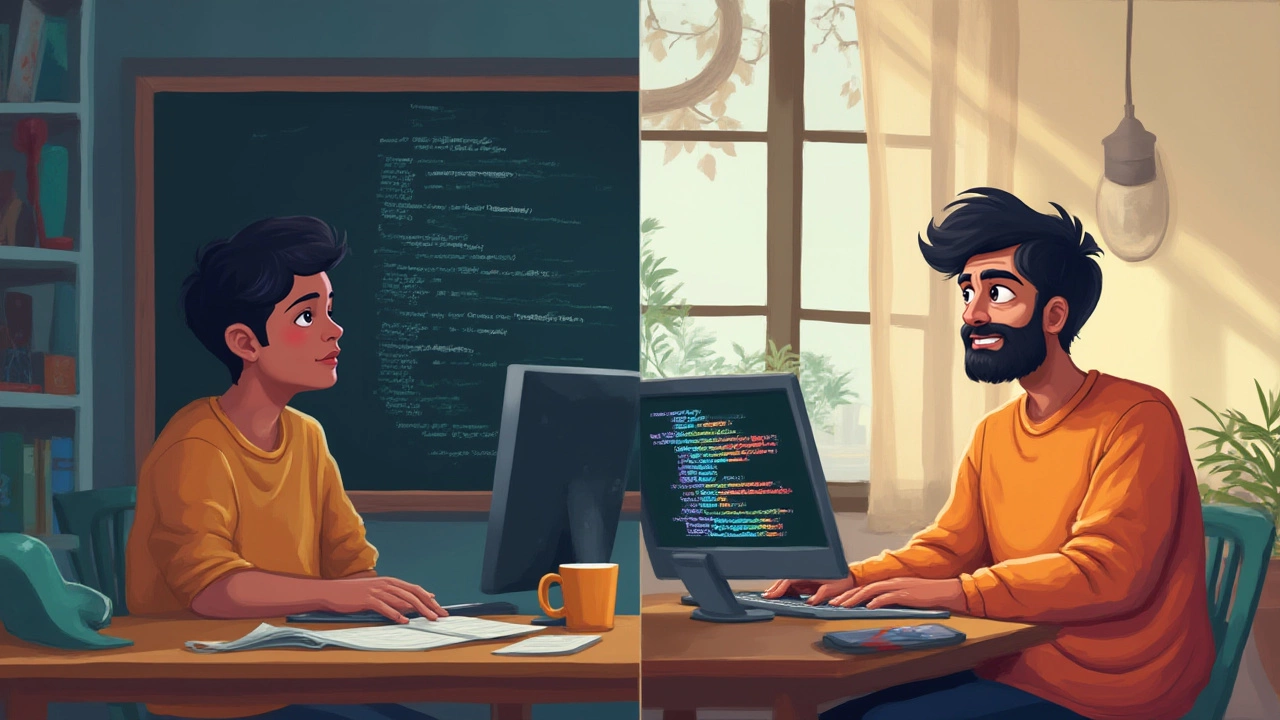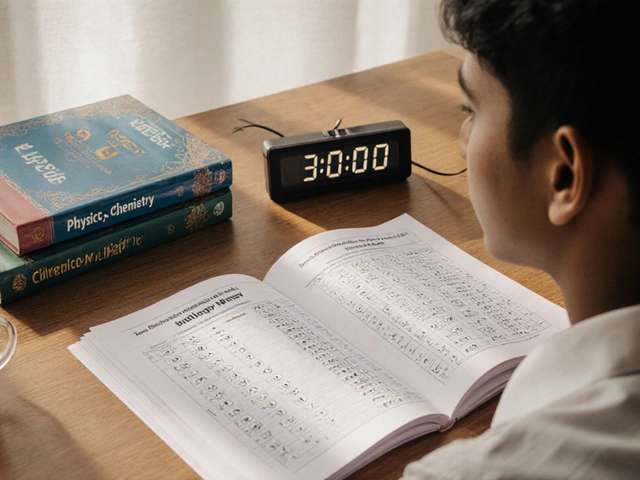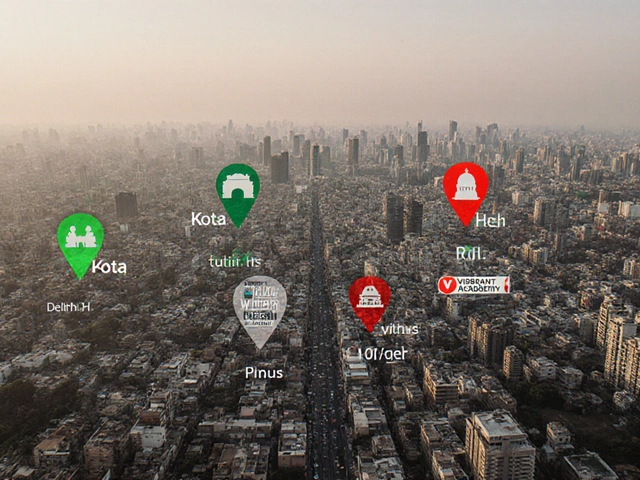Staring at a block of code for the first time can feel like staring at incoherent scribbles. It’s not unusual to think, “Is this even human language?” You’re definitely not the only one who’s felt this. Yet, here’s something wild: Python, one of the most popular programming languages, was designed specifically so people could read and write it easily—even if they weren’t computer science geniuses. The idea that only super-brainy folks can code? It’s just not true. But where does this myth come from, and why does it stick around? Let’s peel this onion and get to the core.
Why Coding Seems So Intimidating
If the thought of learning to code makes your palms sweat, blame Hollywood and old-school teachers. Movies always show hackers typing 500 words per minute in green text, breaking into systems like wizards. That image couldn’t be less accurate. Most programmers spend more time Googling stuff than “hacking the mainframe.” The real challenge isn’t the syntax—it’s the fear that you won’t understand.
Think about math class back in school. For some people, math became this big, scary monster, only because one chapter went over their heads. Coding can feel the same way at first—full of unfamiliar symbols, curly braces, and odd-sounding words like “function” and “variable.” Your brain might scream, “I’m not cut out for this!” But here’s a fact: everyone struggles with that at the beginning. The key difference between those who stick with coding and those who quit is simple—patience and curiosity.
Also, the coding world has its own language. Terms like "API" or "asynchronous" can make anyone trip. You don’t need to become instantly fluent, though. Most professional developers admit they had no idea what most terms meant until they used them in real projects. If you know how to search for answers, you’re halfway there. Search engines are a coder’s best friend. Stack Overflow? That’s practically the second home for every developer.
Many people get intimidated by the idea of memorizing complicated rules. But code is meant to be looked up. Even experts don’t remember all the syntax. They copy-paste, check documentation, and use code editors that help fix errors.
If you can follow a recipe, assemble IKEA furniture, or troubleshoot your smartphone, you already have the kind of problem-solving mindset that coding rewards. It’s not about genius-level IQ—it’s about being okay with making mistakes and figuring things out as you go.
Coding: When Does It Start to Click?
Anyone who started coding remembers the moment when things first started to “click.” Maybe it’s printing out “Hello, World!” on the screen for the first time. Maybe it’s writing a five-line script to sort a list of names. These early “aha!” moments are magic. Most people create something basic in less than a day, like a calculator or a simple webpage. That’s a quick win that gives your confidence a big boost.
The amazing thing? Coding gets easier with “muscle memory.” At first, everything feels manual and slow. But the more you play around, the less you have to think about every tiny detail. If you stick with it (even just 30 minutes a day), basic concepts start to get familiar—variables, loops, functions. Each small project you finish makes the next thing go even smoother.
It’s kind of like learning an instrument. At first, you fumble through the notes, but soon, your fingers know what to do. Some coding bootcamps, like Codecademy and freeCodeCamp, report that most beginners can build functional apps in eight to twelve weeks if they put in regular effort. That’s less than the length of a college semester.
Of course, roadblocks pop up. Bugs, mysterious errors, or the feeling you broke everything—it’s totally normal. Almost every coder, even veterans, spend hours debugging issues that ended up being a missing semicolon or an extra space. The trick is to view these hiccups as puzzles, not failures. Solving one bug at 2 AM for the first time? That’s an unbeatable high.
There’s also the myth that quick learners are born, not made. But a 2023 paper from MIT found that the best prediction for someone’s coding success wasn’t previous math grades or IQ scores; it was the amount of practice and their willingness to keep going after mistakes. Persistence—even more than so-called “talent”—predicts mastery over time.

The Best Way to Learn Coding: Practical Tips
If you ask seasoned developers how they got good at coding, most will tell you: stop reading theories, start doing projects. The sooner you start typing code, the faster your brain soaks it up.
- Learn by building. Pick a mini project that excites you—a to-do list, a game, or even an app that solves your own problem. Projects give you a real reason to learn new things as you go.
- Break big problems into small ones. If “build a website” seems overwhelming, start with “make a page with my name on it.” Move in tiny steps.
- Use resources made for beginners. Websites like freeCodeCamp, Codecademy, and Khan Academy have interactive lessons. They don’t assume you know anything to start with.
- Don’t get stuck on one language. Python is famously beginner-friendly, but you might like JavaScript if you want to build web pages quickly. The concepts transfer from one language to another.
- Google everything! Developers search for answers dozens of times a day. If you’re stuck, someone else has asked the same question online.
- Join a community. Reddit, Discord, and Twitter have huge groups of coders at every level. Post what you’re working on and ask for feedback.
- Set a routine. Even short daily sessions beat long weekly ones. Coding is a skill—repetition makes it stick.
- Write down what you figured out. Keeping a mini-journal or blog locks in your learning and helps the next time you get stuck.
- Work on real stuff. If you can solve a work problem or automate a boring task at home, motivation skyrockets.
One golden tip: Don’t be afraid to mess up. The best breakthroughs happen after you break stuff and figure out how to fix it. The pros still do this every day.
Myths and Misconceptions: What Coding Is NOT
“Do I need to be a math genius?” That question never goes away, but here’s a fact—the average front-end web developer uses basic arithmetic and algebra at most, if any. If you can balance your checkbook, you can handle most of coding’s math. Advanced stuff like artificial intelligence or game engines may need more math, but for 90% of jobs, it’s not a barrier.
Another massive myth: “I’ll be alone, just me and the computer.” In reality, software development is a team sport. Coders are constantly chatting on Slack, leaving notes for each other, and reviewing each others’ work. Collaboration might even be more important than coding skills alone.
Then there’s the idea that you need a four-year degree. Nope. Some of the highest-paid coders built their skills on their own, with YouTube and free online resources. Companies like Google and Apple don’t even require computer science degrees for many roles anymore. They care more about what you can actually build.
Some folks believe coding gets outdated in months. Languages do evolve, but the big concepts—like how to break down problems, organize your thinking, and write logic—last for decades. JavaScript, for example, turned 30 this year but is still the backbone of modern websites. Learning the basics pays off for the long haul.
Finally, don’t let age scare you. The oldest beginner I’ve met started learning Python at 67. Age doesn’t block progress; only giving up does. The internet is full of proud coders showing off their first projects, no matter when they started.

How to Stay Motivated and Keep Growing
Trying to learn to code can feel like running a marathon at first. You’ll have moments where every bug feels like a mountain, and other times when one little win makes your whole week. Motivation is like gas in a car—it runs out sometimes, but you can fill it up again.
Make things public early. Share your projects on GitHub or your personal blog, even if they’re simple. Each comment or like is a shot of encouragement.
Set milestones. Instead of aiming at “learn Python,” shoot for smaller wins: “Make a dice roller app,” “Automate my grocery list,” or “Draw shapes with code.” Every finished thing adds momentum.
Find coding buddies. A friend to message when you’re stuck doubles your chances for breakthroughs. Pair programming or even just chatting about your struggles helps hugely.
Remind yourself of progress. Keep screenshots of your earliest work. When you feel stuck, compare your first “Hello, World!” to your latest project. Growth is sneaky and easy to miss day-to-day.
Never stop exploring. Once you’re comfortable, try new languages, libraries, or platforms. Variety keeps learning fresh and challenges your problem-solving muscles.
Feed your curiosity. The world of coding isn’t just limited to apps and games. People use these skills to control drones, analyze massive data sets, improve healthcare, make music, and automate daily chores. Check out stories about what coding helped people build, and get inspired for your own projects.
So, is coding hard to learn? It can feel tough at the start, with its weird rules and error messages. But it’s much more open—and honestly, way more fun—than the old stereotypes would have you think. Take it slow. Solve tiny problems. Celebrate your wins. And remember, the next great coder could be the one who’s reading this paragraph right now.









0 Comments